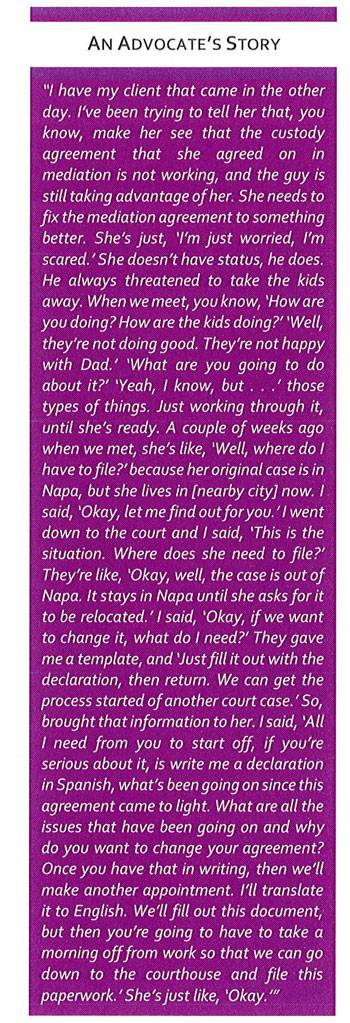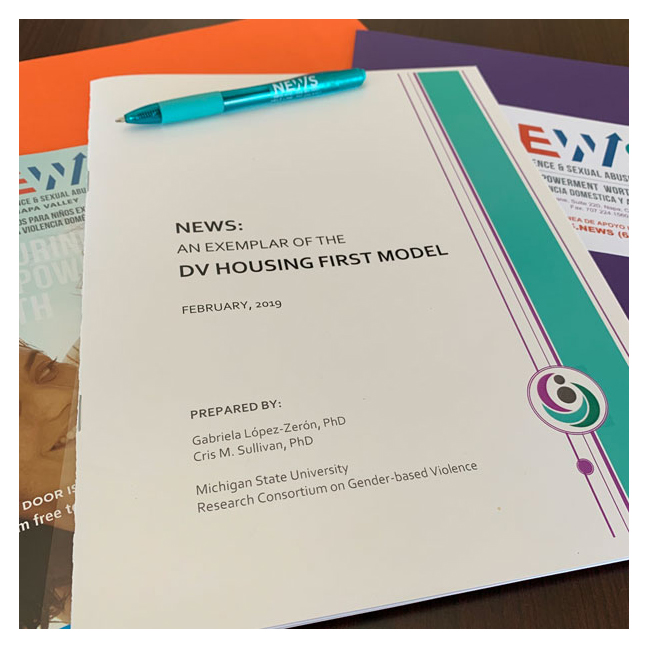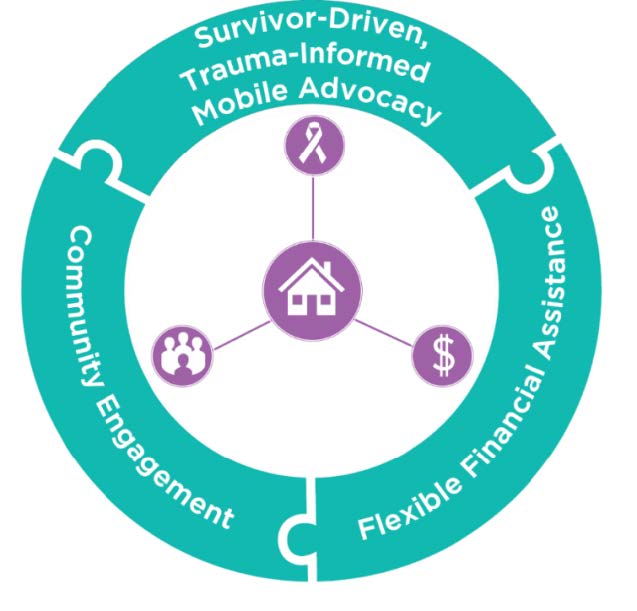Housing
NEWS: AN EXEMPLAR OF THE DV HOUSING FIRST MODEL
PREPARED BY: Gabriela López-Zerón, PhD; Cris M. Sullivan, PhD, Michigan State University, Research Consortium on Gender-based Violence, February 2019
BACKGROUND
In 2017, the California Governor’s Office of Emergency Services (Cal OES) funded 33 non-profit agencies to implement the Domestic Violence Housing First (DVHF) model. The DVHF model focuses on helping survivors get into safe and stable housing as quickly as possible and providing ongoing supportive services to help them move forward with their lives.
As part of a statewide evaluation of the DVHF model, NEWS is being highlighted as an exemplar of their outstanding work in the three pillars of the model. NEWS, located in Napa Valley, California, is dedicated to providing safety, hope, healing, and empowerment for survivors of domestic and sexual abuse. NEWS is equally committed to promoting safe communities and social change through prevention, intervention, education, and advocacy.
EVALUATION PROCESS
The NEWS leadership and staff graciously agreed to provide the evaluation team with more in-depth information of how the DVHF model works in their agency in order to help us offer guidelines to other organizations. The evaluation team initially visited NEWS to better understand the organization’s implementation of the model. After developing an initial understanding of the practices that support the success of the DVHF model through informal meetings with leadership and staff, we met with a local landlord and a property manager who have close partnerships with NEWS.
On a follow up visit, we gathered more in-depth information about the organizational structures that support the model and obtained survivor testimonials. We interviewed the NEWS’ Housing Team (two advocates and one supervisor), Program Director, and Executive Director. Further, we interviewed five survivors, three of whom were Spanish speaking. Interviews were conducted in either English or Spanish, depending on survivor preference.
What became evident, after reviewing all of this information, is that NEWS’ leadership not only provides the resources and flexibility to allow for the model to work well, but they also promote the pillars of the model throughout all of their programs.
Survivor-driven, Trauma-informed, Mobile Advocacy
A central component of the DVHF model is a focus on addressing the needs identified by survivors rather than on pre-determined needs promoted by agencies. Advocates are mobile, working with survivors in the community, rather than solely working in their offices. Another critical component is that advocacy continues as long as survivors need support. Advocates work with survivors on a myriad of issues (e.g., employment, legal support, immigration, health, children’s needs) while also working with them to obtain housing stability.
Mobile advocacy is a particularly important aspect of the DVHF approach. Advocates work out in the community, meeting survivors in the locations of their choice. This can be at the park, in a coffee shop, or at the survivor’s home. When meeting in the community and having informal conversations, advocates are better able to understand survivors’ contexts and even notice some needs that survivors might not have mentioned yet. Mobile advocacy also includes accompanying survivors as they obtain community resources, whether that means searching together in the community for housing, employment, or going together to appointments. These flexible meetings allow advocates to demonstrate to survivors that they intend to walk their journey with them and build a trusting relationship.
How NEWS supports this pillar
NEWS’ organizational climate is structured to support this pillar in clear and important ways. The leadership offers ongoing training to all staff, and weekly supervision meetings. In these weekly meetings, they provide consistent supervision and support, offering suggestions without micromanaging direct service staff.
A common occurrence related by multiple advocates across the nation is the experience of feeling frustrated when survivors make decisions that advocates might consider unsafe or unwise. The leadership at NEWS recognizes that this is an all-too-common experience and so they encourage staff to openly discuss these concerns in safe and supportive supervision meetings where they reinforce the importance of survivor-driven advocacy. Through this flexible approach, the leadership conveys an important message of trust, support, and flexibility to their staff.
As a result, direct service providers and supervisors alike are unbounded in their thinking about the supportive services they offer their clients. They do not think only in terms of housing and safety; they also consider survivors’ overall wellbeing and wholeness. Further, they recognize how difficult it can be to go through all of these processes alone. Advocates maintain flexible work schedules, working evenings and weekends when necessary. The leadership fully supports advocates’ flexible schedules and trusts that they are doing what needs to be done to provide effective advocacy.
NEWS advocates described the collaborative nature of their work, expressing the importance of feeling supported by their supervisor and the organization’s leadership. They also have the freedom and authority to make decisions when they are out in the community without being micromanaged. For instance, if an advocate is out all day with a family, they might stop at a fast food restaurant for lunch and pay for the family to eat. NEWS trusts that advocates are making thoughtful decisions to provide the services families need, and reimburses them for their mileage and expenses.
The Housing Team at NEWS is in close and regular contact, sharing one office among the three team members. Although sharing an office might have a downside (e.g., not enough private space to meet with clients), advocates expressed their satisfaction with having opportunities to brainstorm and bounce ideas off each other. Further, advocates can discuss their caseloads and consult with their supervisor when needed. Advocates also mentioned that sharing an office led to them getting to know each other better on a personal level, which has led to greater feelings of support.
Advocates implementing the DVHF model at NEWS have relatively small caseloads. The Housing Team supervisor, who provided direct services for many years, understands that having a high caseload does not allow enough time for an advocate to provide the services that a family might need. Therefore, she monitors each advocate’s caseload, not allowing it to exceed 10 families (with some flexibility depending on the complexity of services provided). This decision is not made lightly and is emotionally difficult for the team, as this means they often have a waitlist. However, they believe it is critical to provide clients with the level of services they actually need in order to see long-term improvements in their lives.
You may download the full report HERE.




